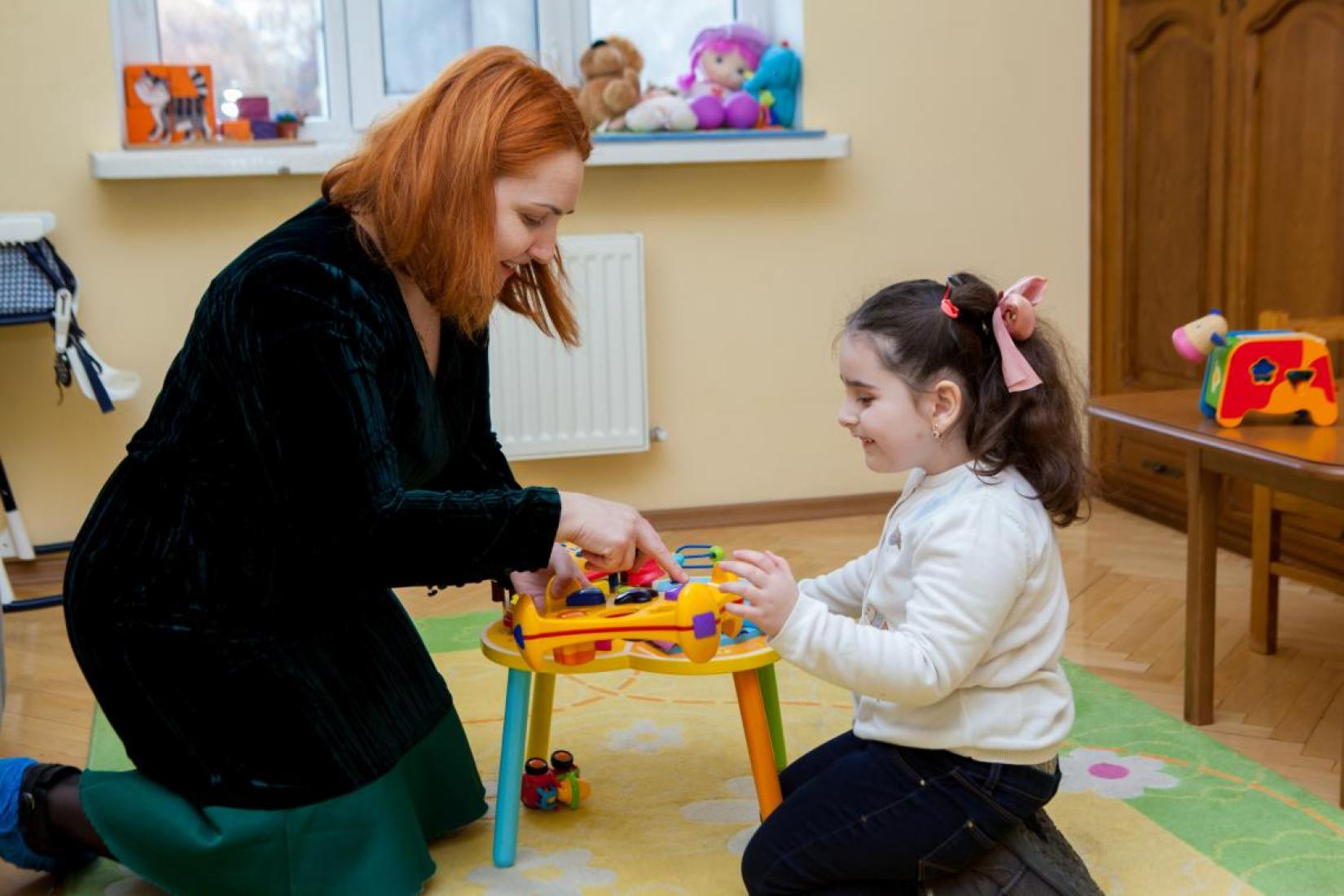UNICEF provides hygiene products for children with special needs to prevent COVID-19
09 December 2022
- These donations, with USAID support, are a lifeline for the parents, who have only one goal – to support their children.

After the first nine months of life, Valentina received a harsh diagnosis from doctors – mixed cerebral palsy. More than four years later, her childhood continues to be marked by countless visits to healthcare facilities and rehabilitation centres, where health professionals try to give her the support she needs. Even though she is raising her daughter alone, her mother Tatiana says she readily accepted the fight for Valentina's life. In recent years however, the lack of financial means and the onset of the COVID-19 pandemic have reduced her strength and confidence.
‘I didn't know how to raise a child, let alone one with special needs. I listened to the recommendations of doctors, specialists and, lo and behold, she managed to take the first steps and later to maintain her balance. We were hardly ever at home. We spent a lot of time in hospital wards, and for three years we continuously went to therapy, such as physical therapy, massage sessions and more,’ says Tatiana.
When Valentina turned three, the specialist rehabilitation services became more expensive and less accessible, so Tatiana had to struggle to meet her child's daily needs. Today, the young mother manages the dormitory of the Republican High School ‘Ciprian Porumbescu’ from Chișinău, and earns a monthly income of about 4,000 lei – which is not sufficient for them. Furthermore, due to her health problems, Valentina is at risk of developing a serious form of COVID-19 if infected, and protective measures such as constant disinfection of the house, and frequent isolation have become a priority. This means extra costs for hygiene products, protection, and medicines.
‘I follow all the rules to protect us from COVID-19, but due to weak immunity, both Valentina and I suffered from the disease several times, which has affected us a lot. We spent many weeks in absolute isolation,’ says Tatiana.
Even though Valentina no longer meets all the age requirements for free early childhood intervention services, the team of the Voinicel Center continues to provide support, counselling and training. The Center also provides them with basic necessities, such as a basket of hygiene and care products, donated by UNICEF, with the financial support of the United States Agency for International Development (USAID).
‘Yesterday I bought two hygiene products and spent almost 150 lei. Can you imagine how much these products will benefit me? That's 20% to 30% of my monthly expenses, since cleaning products are quite expensive, but necessary.
‘I try to take care of my daughter's hygiene because it is especially important for her physical and mental health. Know that these donations are a lifeline for the parents who today have only one goal – to save their children,’ says Tatiana happily as she looks forward to going through all the products received.
With support from USAID, UNICEF procured and donated hygiene kits worth MDL 15,000 each to 10 institutions providing early intervention services for children, partners of the Voinicel Early Intervention Center, as well as to 26 other residential institutions of Moldova. Moreover, another batch of hygiene products worth about MDL 165,000 was distributed to 300 families caring for children with special needs.
It should be noted that the donations were granted following an assessment of the quality of life of the families raising and educating children with special needs, which was carried out as part of the humanitarian programme implemented by UNICEF, in partnership with the Voinicel Center and with financial support from USAID.
‘The COVID-19 pandemic has had a severe impact on the peace and well-being of our families. Unfortunately, the crisis is ongoing and without continuous support, we risk leaving many vulnerable families and children in the shadow of the system,” said Daniela Bordeianu, Executive Director of the Voinicel Center.
The results of the assessment revealed that the biggest problems faced by the respondents related to the future and health of their children, worsening financial difficulties, poor quality of education services for children with health problems, limited access to health services, and psycho-emotional stress due to the conflict in Ukraine,’ said Bordeianu.
UNICEF is working with partners in Moldova to support children with special needs. Iin 2021, with the support of USAID, UNICEF donated a batch of protection and hygiene materials for the staff of the Psycho-pedagogical Assistance Services, children with hearing impairment and children with special educational needs from 35 districts, including ATU Gagauzia. This includes 10,632 clear face masks, 1,100 litres of disinfectant solution and 4,600 gloves.



